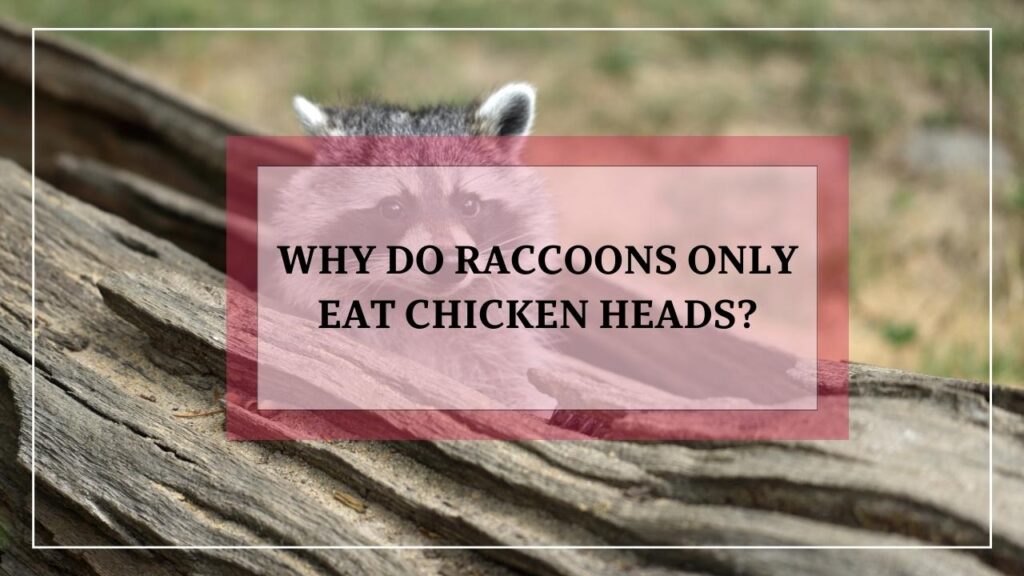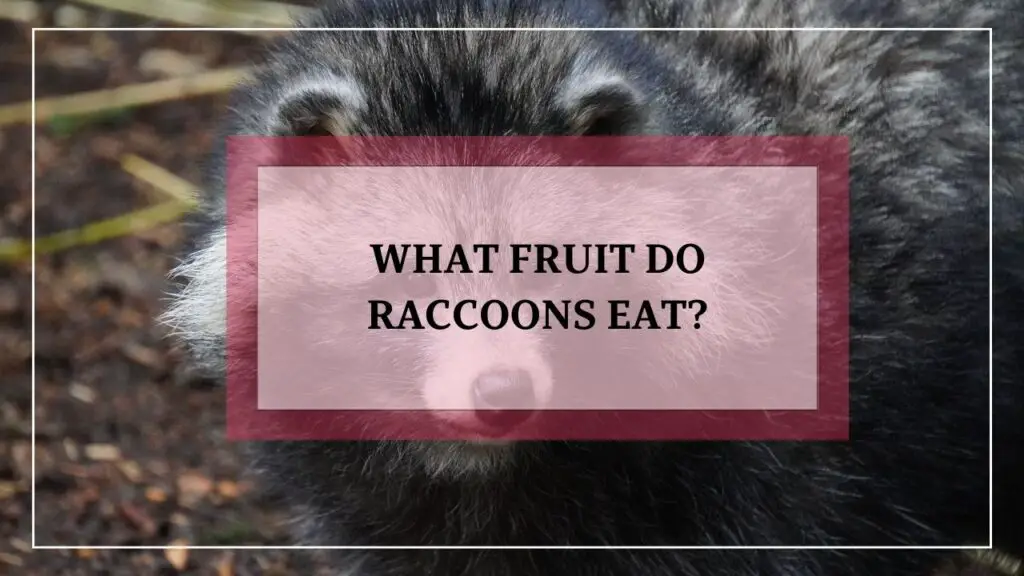Raccoons are fascinating creatures that live in forests and sometimes even in cities. They have a reputation for being clever and mischievous. One interesting thing about raccoons is that they eat a variety of foods, including fruits, vegetables, insects, and even small animals. But have you ever wondered why raccoons seem to love eating chicken heads? Well, the answer is quite simple!
https://animalsman.com/what-role-do-raccoons-play-in-the-food-web/
Raccoons are scavengers, which means they look for food in different places, like trash cans or even in the wild. They have a keen sense of smell and can sniff out yummy food from afar. Chickens are commonly found on farms, and unfortunately, sometimes their heads are left behind after they are prepared for humans to eat. Raccoons find these leftovers and see them as an easy and tasty meal. It’s like finding a piece of pizza with all the yummy toppings already eaten!
https://animalsman.com/what-do-raccoons-eat-rats/
So, to sum it up, raccoons eat chicken heads because they are scavengers and love finding easy food sources. Just like humans have different food preferences, raccoons have their own too!
Related Article:Why Do Raccoons Bark?
https://animalsman.com/what-do-raccoons-die-from/
Introduction
Hey there, ever wondered why raccoons have such a peculiar taste for chicken heads? It’s a question that has puzzled many animal enthusiasts and chicken farmers alike. In this article, we’ll dive into the fascinating world of raccoons and explore the reasons behind their chicken head obsession.
https://animalsman.com/what-do-raccoons-sound-like-when-theyre-fighting/
Understanding Raccoons
A. General information about raccoons
Raccoons are curious creatures known for their distinctive physical characteristics and mischievous behavior. With their masked faces, ringed tails, and nimble paws, they have become a familiar sight in many parts of the world.
https://animalsman.com/what-does-rabies-do-to-raccoons/
1. Physical characteristics
Raccoons are medium-sized mammals with a stocky build and a coat of grayish fur. Their most recognizable feature is the black mask-like markings around their eyes, which earned them the nickname “bandit.” Additionally, their bushy tails are adorned with alternating black and white rings, making them quite fashionable in the animal kingdom.
2. Habitat and distribution
These resourceful critters are native to North America but have also been introduced to various regions around the world. They are adaptable creatures and can thrive in a wide range of habitats, including forests, marshes, and urban areas. In fact, you might have spotted a raccoon rummaging through your garbage cans in the middle of the night!
3. Behavior and feeding habits
Raccoons are opportunistic omnivores, meaning they have a diverse diet that includes both plant and animal matter. They are skilled foragers and use their dexterous paws to search for food in various environments. From berries and nuts to small mammals and insects, raccoons are not picky eaters. However, they do seem to have a particular fondness for chicken heads, and that’s what we’re here to uncover.
B. Raccoons as omnivores
1. Discuss their diet diversity
One of the key traits that make raccoons successful survivors is their ability to adapt their diet to changing circumstances. They are true culinary connoisseurs, sampling a wide array of food options depending on what’s available. This adaptability allows them to thrive in both natural and human-altered environments.
2. The importance of adaptability
Being able to adjust their diet to different food sources is crucial for raccoons, especially in areas where natural resources may be limited. They can switch from eating fruits and nuts to raiding trash cans or even hunting small animals. This flexibility in their feeding habits ensures their survival and helps explain their affinity for chicken heads.
Understanding Raccoons
A. General information about raccoons
Raccoons are fascinating creatures known for their distinctive physical characteristics and clever behavior. They have a compact and sturdy build, with a pointed snout, round ears, and a ringed tail. Their fur is typically grayish-brown, and they have a black mask-like pattern around their eyes, which gives them a mischievous appearance.
Related Article:Why Do Raccoons Chase You?
These omnivorous mammals are native to North America and can be found in a variety of habitats, such as forests, wetlands, and urban areas. They are highly adaptable and have successfully established populations in many regions across the world.
B. Raccoons as omnivores
Raccoons have a diverse diet that includes both plant and animal matter. They are true omnivores, meaning they can eat a wide range of foods, including fruits, nuts, insects, small mammals, birds, and even garbage. This adaptability is a key factor in their survival and ability to thrive in various environments.
Their opportunistic feeding habits allow them to take advantage of available food sources, making them highly resourceful creatures. Raccoons are known for their ability to open containers, raid trash cans, and scavenge for food in both natural and human-made habitats.
So, while raccoons may have a preference for chicken heads, it’s important to remember that they are not solely restricted to this particular food item. Their diet is much more diverse and can vary depending on the availability of different food sources in their environment.
Understanding raccoons’ behavior and feeding habits is essential for finding ways to coexist with them and mitigate any potential issues they may cause. In the next section, we’ll explore the reasons behind raccoons’ preference for chicken heads and discuss some strategies for preventing unwanted encounters.
Raccoons and Chicken Heads
Raccoons’ scavenging behavior
Raccoons are natural scavengers in the wild, which means they have a knack for finding and exploiting food sources. They have a highly adaptable diet and can eat a wide variety of foods, including fruits, vegetables, insects, small mammals, and even garbage. This adaptability allows them to survive in various environments and take advantage of available resources.
Factors influencing raccoons’ preference for chicken heads
So, why do raccoons seem to have a particular affinity for chicken heads? There are a few factors at play here. First, chicken heads are often rich in nutrients and provide a concentrated source of protein. Raccoons are opportunistic eaters, and they will naturally gravitate towards food sources that offer the most nutritional value.
Additionally, the accessibility of chicken heads may contribute to their popularity among raccoons. Chicken coops are often not as secure as other food storage areas, making it easier for raccoons to access the heads. Raccoons are intelligent creatures and can quickly figure out how to open doors or break into containers to get to their desired food.
Furthermore, raccoons have specific prey selection and hunting strategies. They are skilled at catching small animals, such as chickens, and their hunting behavior may be influenced by environmental factors. For example, if other food sources are scarce or less accessible, raccoons may be more inclined to target chicken heads as a reliable and easily obtainable food source.
Chicken heads as a readily available food source for raccoons
Human influence also plays a role in raccoons’ preference for chicken heads. With the rise of chicken farming and the disposal of chicken waste, raccoons have easy access to this food source. Improper waste management practices can attract raccoons to farms, where they can find a buffet of chicken heads waiting for them.
In conclusion, raccoons’ preference for chicken heads can be attributed to a combination of factors, including their scavenging behavior, the nutritional value and accessibility of chicken heads, and the influence of human activities. Understanding these factors is crucial for mitigating the risks associated with raccoons consuming chicken heads and finding ways to coexist peacefully with these resourceful creatures.
Related Article:Why Do Raccoons Carry Rabies
IV. Implications and Concerns
A. Risks associated with raccoons consuming chicken heads
Raccoons may be cute and clever, but their fondness for chicken heads can pose certain risks. One concern is the potential transmission of diseases. Chicken heads can carry bacteria and parasites that are harmful to both humans and raccoons. By consuming these heads, raccoons can inadvertently spread these pathogens to other areas, increasing the risk of disease transmission.
Another issue is the negative impact on chicken populations. Raccoons are opportunistic predators, and their preference for chicken heads can result in significant losses for chicken farmers. Not only can raccoons decimate a flock, but they can also cause stress and anxiety among the remaining chickens, affecting their overall well-being and productivity.
B. Mitigation strategies for chicken farmers
Chicken farmers facing raccoon-related challenges can employ various strategies to protect their flocks and minimize losses. Here are a few helpful tips:
1. Secure coop design and maintenance: Ensure that chicken coops are sturdy and well-constructed, with no gaps or openings that raccoons can exploit. Regularly inspect and reinforce fences, doors, and windows to prevent raccoon intrusion.
2. Predator deterrents and repellents: Use deterrents such as motion-activated lights, sprinkler systems, or even loud noises to startle and discourage raccoons from approaching the coop. Natural repellents like vinegar or predator urine can also be effective in deterring these masked bandits.
3. Proper waste management: Raccoons are attracted to food sources, so it’s crucial to properly manage chicken waste and leftover feed. Securely store any food or scraps that could attract raccoons, and dispose of them in a way that doesn’t entice these opportunistic eaters.
V. Coexisting with Raccoons
A. Tips for preventing raccoon intrusion
While it’s important to protect your chickens, it’s also possible to coexist peacefully with raccoons. Here are a few tips to prevent raccoon intrusion into your property:
1. Securing garbage cans and compost bins: Raccoons are notorious for rummaging through trash in search of food. Make sure your garbage cans and compost bins have secure lids or are stored in raccoon-proof enclosures to discourage these scavengers.
2. Removing attractants from the property: Avoid leaving pet food or bird feeders outside overnight, as they can attract raccoons. Additionally, seal any potential entry points into your home or outbuildings to prevent raccoons from seeking shelter.
B. Humane solutions for raccoon-related issues
If you’re dealing with persistent raccoon problems, it’s essential to approach the situation with compassion and seek humane solutions. Here are a couple of options:
1. Encouraging natural deterrents: Planting prickly or thorny shrubs around your property can create a barrier that discourages raccoons from entering. Additionally, installing motion-activated lights or sprinklers can startle raccoons and make them think twice about sticking around.
Related Article:Why Do Raccoons Climb Trees
2. Seeking professional assistance when necessary: If you’ve tried various preventative measures and still struggle with raccoon issues, consider reaching out to a professional wildlife removal service. They can safely and humanely trap and relocate raccoons, ensuring the well-being of both the animals and your property.
By understanding raccoon behavior and implementing preventative measures, you can coexist with these resourceful creatures while protecting your chickens and property.
Coexisting with Raccoons
Tips for preventing raccoon intrusion
Raccoons can be quite the sneaky critters, always on the hunt for food. But fear not, my friend, for there are ways to prevent them from wreaking havoc on your property. Here are a few tips to keep those trash bandits at bay:
1. Securing garbage cans and compost bins: Raccoons are masters of dumpster diving, so it’s important to make sure your trash cans are raccoon-proof. Invest in sturdy bins with secure lids or consider using bungee cords to keep those clever paws out. And don’t forget about your compost bins! Raccoons find those smelly compost goodies irresistible, so make sure they are tightly sealed.
2. Removing attractants from the property: Raccoons have a keen sense of smell, so it’s important to eliminate any enticing scents from your yard. If you have a fruit tree, make sure to pick up fallen fruit regularly. Bird feeders can also be a tempting treat for raccoons, so consider bringing them in at night or using baffles to prevent access.
Humane solutions for raccoon-related issues
Now, my friend, I know raccoons can sometimes be a nuisance, but let’s remember that they are just trying to survive in this big, wild world. If you find yourself in a raccoon conundrum, here are some humane solutions to consider:
1. Encouraging natural deterrents: Raccoons are clever, but they can be deterred by some natural methods. For instance, planting prickly bushes or installing motion-activated sprinklers can make your property less appealing to these masked bandits. You can also use devices that emit high-frequency sounds that are unpleasant to raccoon ears.
2. Seeking professional assistance when necessary: If your raccoon problem persists or becomes a serious concern, it might be time to call in the experts. Wildlife control professionals can provide guidance and assistance in dealing with raccoon issues, ensuring that both you and the raccoons are safe and sound.
Remember, my friend, that coexisting with raccoons is all about finding a balance. By implementing these preventative measures and considering humane solutions, you can peacefully share your space with these resourceful creatures. So go forth and keep those chicken heads safe from those mischievous raccoon hands!
FAQs
Why do raccoons only eat chicken heads?
Raccoons are opportunistic feeders and have a varied diet. While it is a misconception that raccoons only eat chicken heads, they may target specific parts of a chicken, such as the head, due to its high concentration of soft tissues and brain matter. However, raccoons are known to eat various foods like fruits, vegetables, insects, small mammals, birds, eggs, and even garbage.
Do raccoons exclusively eat chicken heads?
No, raccoons do not exclusively eat chicken heads. As omnivores, raccoons have a wide dietary range and can consume various food sources. While they may opportunistically target chicken heads for their nutritional value, raccoons are known to eat other parts of chickens, along with a diverse array of foods found in their habitat.
Related Article:Why Do Raccoons Bite Humans?
Is it common for raccoons to eat chicken heads?
While raccoons may occasionally eat chicken heads, it is not a common or exclusive behavior. Raccoons have adaptable feeding habits and consume a wide range of foods based on availability and nutritional needs. They are known to scavenge for food in natural habitats as well as human-populated areas, where they may encounter chickens or other food sources.
Conclusion
In conclusion, raccoons are fascinating creatures with diverse diets and adaptable feeding habits. While they are omnivores and can consume a wide range of food sources, including fruits, vegetables, insects, and small animals, their preference for chicken heads can be attributed to various factors.
Raccoons’ scavenging behavior and ability to exploit food sources play a significant role in their preference for chicken heads. The nutritional value and accessibility of chicken heads, as well as their hunting strategies and the impact of environmental factors, can all contribute to their choice.
Human influence on raccoon diet, particularly through chicken farming and waste disposal practices, has also made chicken heads a readily available food source for these animals. This has implications and concerns for both raccoons and chicken populations, including the potential transmission of diseases and negative impacts on chicken populations.
To mitigate the risks associated with raccoons consuming chicken heads, chicken farmers can implement various strategies, such as secure coop design and maintenance, predator deterrents and repellents, and proper waste management.
For individuals coexisting with raccoons, prevention is key. Securing garbage cans and compost bins, as well as removing attractants from the property, can help prevent raccoon intrusion. Additionally, focusing on humane solutions, such as encouraging natural deterrents and seeking professional assistance when necessary, can ensure a harmonious coexistence with these animals.
In conclusion, understanding raccoon behavior and implementing preventative measures are crucial in managing the issue of raccoons consuming chicken heads. By doing so, we can protect both the interests of chicken farmers and the well-being of raccoons in our communities.

Hi, I’m Ali Tarek, the founder of Animalsman. I’ve always been passionate about pets, especially dogs and cats, and I created this website to share practical tips, easy recipes, and helpful care advice for fellow pet lovers. My goal is to make pet care simple, enjoyable, and accessible for everyone. When I’m not writing or curating content, you’ll usually find me spending time with my furry friends or learning new ways to keep them happy and healthy.



